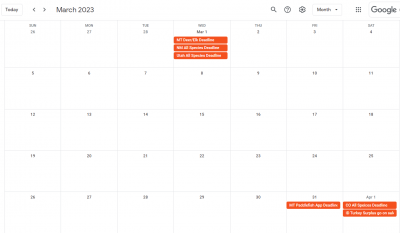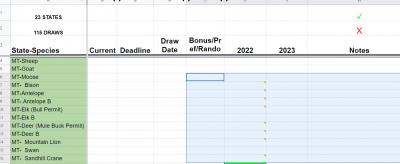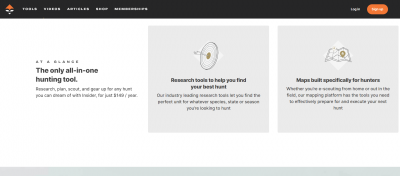Prep for Application Season
Everett Headley 02.24.23

This is the time when hopes and dreams reign supreme. The hurts and misses of last season fade and the anticipation of redemption in the next grows. But as they say, you gotta pay to play and for hunters this means applications.
If you’re new to hunting out of your home state, it can seem daunting knowing where to begin. My best advice is to just dig in and go for it. Recruiting buddies to help can lighten the financial load. Do your research, especially on local wildlife laws. These hunts will be what you make them:
- Determine the Experience You Want. This includes your preferred weapon, new geography and landscapes, level of difficulty, and the pursuit of a new species.
- Consider Your Budget. We all have responsibilities on the homefront that take priority, but a little bit saved over time can get you where you need to be.
- Don’t Deviate from the Plan. Once you see the goal, see it through to completion.
For us who have played the application game for many seasons, a refresher can be helpful. The pain of missing out on a point because the application wasn’t submitted is real; it cuts deeper when that missed year causes your points to reset to zero. Application services can help you out and are worth researching if they fit for you. I keep my own records and research with the help of goHunt. I use the checklist below will help prevent mishaps during application season.
1. Set up an online calendar.

Forget trying to remember when the next deadline is to submit your application. I set mine to send me an email reminder two weeks before the deadline to give me plenty of time to research that hunt. I have a secondary reminder that sends me a notification the day before the last day to submit. This small amount of redundancy has saved me countless times. Keeping it digital makes it easy to share and export to another platform if needed. I also include seasons as one large block of time, when commission meetings are scheduled that might change regulations, and any other dates that might have significance in the planning of a hunt.
2. Make a spreadsheet.

My inner hunting-nerd is definitely smiling about this one, but long before online services kept track of points I was operating my own spreadsheet. This can be as simple as logging the species and number of points accumulated, but the more you can input the more value long term and use you’ll see. I include: state, species, points by year, login information, dates and deadlines, and notes on each draw for the year. Over fifteen years of draw information helps me to quickly see how a particular draw has performed for me and make adjustments. Color coding helps to differentiate between states and bright green/glowing red is a quick reference on if that application is complete or not. At last count I have applied in over twenty states and 100 draws; the only way I stay current is with my points tracker.
3. Keep good notes.
If I lost you on the digital calendar and making a spreadsheet, then I hope this one will bring you back. I maintain a note file of my hunts covering the research and planning, what happened on the hunt, and a breakdown afterwards of how it went. In the military we called these ‘after action’ reports and they were meant to make the next engagement quicker and more decisive. I’ve carried that same idea into my adventures, especially ones that happen every year like Wyoming antelope. I will keep screenshots, pictures of written notes, links, and anything that might give me just a little more insight for the next time I plan the hunt. A year is a long time to try to remember what the name was of that rancher you happened to meet over breakfast who said to try him next summer for access. Those nuggets are extremely valuable and worth a minute to make sure they aren’t lost.

Check the new regulations book.
Deadlines move, hunting district numbers change, and tags are adjusted every year. I never assume anything has remained static and read the regulations like it is the first time. While I’m at it, I save a pdf copy to my phone for quick reference in the field later on. Some states (like mine in Montana) make changes throughout the year and put the update on the website, so a last minute check before applying and hunting can be a big save.
Consider upcoming logistics.
Covid was the great instructor on how quickly things can change logistically. Different states had their own regulations and international travel was oftentimes impossible. Price changes and product availability can vary widely and a few phone calls can help prevent a disaster later on. Bush flights in Alaska have seen significant increases in the past two years and availability is just as far out. The sooner you can secure a reservation on your travel, lodging, and other details, the less expensive it will be and you’ll have a certainty to plan around.
Leave yourself open for unexpected opportunities.
There are three categories that come to mind: Cancellation lists, unexpected invitations, and ad hoc management hunts. During the pandemic there were great deals to be found on hunts outfitters were looking to fill at the last minute. If there is a hunt on your bucket list, contacting your preferred outfitter and asking to be put on that list could help you to get it done quicker and cheaper. There have been more than a few unique opportunities in state and national parks recently to cull a particular species. Hunters were selected via a lottery after filling out applications. Keeping a reserve of time and money for trips like this can have a huge return on investment.
Don’t wait to apply/buy.
It is well known that if you wait until the final day to submit your application that the agency website will crash or the postman will decide to go fishing instead of delivering your envelope. I make my application as early as possible, most of the time on the first day it opens. There are a few exceptions where I am waiting on last minute tag allocations, but I am ready to finalize it as soon as those are published. This is probably most relevant after applications and draws are over and you still need to buy your point for the year. The anticipation is gone and so is the urgency to meet the deadline. Don’t put it off and loose on another year of waiting.

